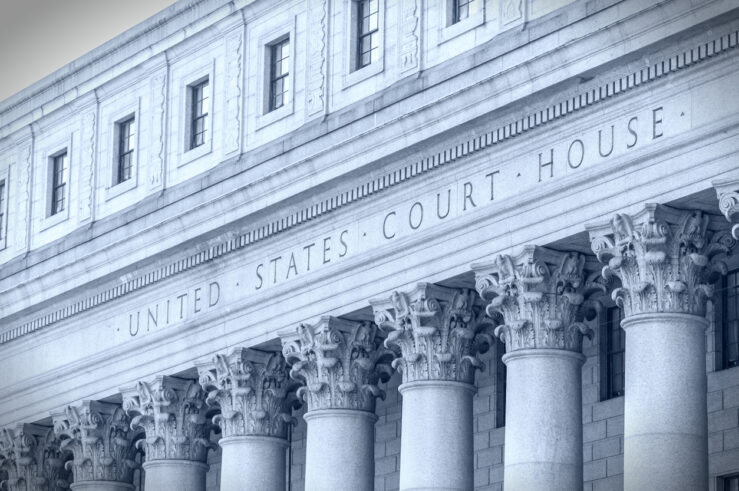Showing archive for: “Law & Economics”
The Law & Economics of the First Amendment: Curation, Targeted Advertising, and Access to Online Speech
We at the International Center for Law & Economics (ICLE) filed an amicus brief earlier this month to the U.S. District Court for the Northern District of California in the NetChoice v. Bonta case. It was an updated version of the brief we filed earlier this year before the 9th U.S. Circuit Court of Appeals. ... The Law & Economics of the First Amendment: Curation, Targeted Advertising, and Access to Online Speech
Why Armen Alchian Is the GOAT
Tyler Cowen has a new online book out titled “GOAT: Who is the Greatest Economist of All Time, and Why Does it Matter?” While there are potential problems in treating ideas like basketball, the project is a fun, fast read overall. As the author of a newsletter with frequent gifs, I’m all for encouraging light-hearted ... Why Armen Alchian Is the GOAT
The Law & Economics of Children’s Online Safety: The First Amendment and Online Intermediary Liability
Legislation to secure children’s safety online is all the rage right now, not only on Capitol Hill, but in state legislatures across the country. One of the favored approaches is to impose on platforms a duty of care to protect teen users. For example, Sens. Richard Blumenthal (D-Conn.) and Marsha Blackburn (R-Tenn.) have reintroduced the Kid’s ... The Law & Economics of Children’s Online Safety: The First Amendment and Online Intermediary Liability
Biweekly FTC Roundup: Antitrust Woodstock Edition
Last week’s roundup was postponed because I was kibbitzing at the spring meeting of the American Bar Association (ABA) Antitrust Section. For those outside the antitrust world, the spring meeting is the annual antitrust version of Woodstock. For those inside the antitrust world: Antitrust Woodstock is not really a thing. At the planetary-orbit level, the ... Biweekly FTC Roundup: Antitrust Woodstock Edition
Biweekly FTC Roundup: Throwing Stones in Glass Containers Edition
In February’s FTC roundup, I noted an op-ed in the Wall Street Journal in which Commissioner Christine Wilson announced her intent to resign from the Federal Trade Commission. Her departure, and her stated reasons therefore, were not encouraging for those of us who would prefer to see the FTC function as a stable, economically grounded, ... Biweekly FTC Roundup: Throwing Stones in Glass Containers Edition
Biweekly FTC Roundup: Total Drama Island Edition
In a Feb. 14 column in the Wall Street Journal, Commissioner Christine Wilson announced her intent to resign her position on the Federal Trade Commission (FTC). For those curious to know why, she beat you to the punch in the title and subtitle of her column: “Why I’m Resigning as an FTC Commissioner: Lina Khan’s ... Biweekly FTC Roundup: Total Drama Island Edition
The FTC UMC Roundup – Welcome to June Edition
Welcome to the FTC UMC Roundup for June 3, 2023–Memorial Day week. The holiday meant we had a short week, but we still have plenty of news to share. It also means we’re now in meteorological summer, a reminder that the sands of legislative time run quickly through the hourglass. So it’s perhaps unsurprising that ... The FTC UMC Roundup – Welcome to June Edition
Application of the Proper ‘Outer Boundary’ of Antitrust Liability for Alleged Refusals to Deal in New York v Facebook
Introduction The States brought an antitrust complaint against Facebook alleging that various conduct violated Section 2 of the Sherman Act. The ICLE brief addresses the States’ allegations that Facebook refused to provide access to an input, a set of application-programming interfaces that developers use in order to access Facebook’s network of social-media users (Facebook’s Platform), ... Application of the Proper ‘Outer Boundary’ of Antitrust Liability for Alleged Refusals to Deal in New York v Facebook
Assessing Less Restrictive Alternatives and Interbrand Competition in Epic v Apple
The International Center for Law & Economics (ICLE) filed an amicus brief on behalf of itself and 26 distinguished law & economics scholars with the 9th U.S. Circuit Court of Appeals in the hotly anticipated and intensely important Epic Games v Apple case. A fantastic group of attorneys from White & Case generously assisted us ... Assessing Less Restrictive Alternatives and Interbrand Competition in Epic v Apple
In Apple v Epic, 9th Circuit Should Remember that Antitrust Forbids Enhancing, not Exercising, Market Power
On March 31, I and several other law and economics scholars filed an amicus brief in Epic Games v. Apple, which is on appeal to the U.S. Court of Appeals for Ninth Circuit. In this post, I summarize the central arguments of the brief, which was joined by Alden Abbott, Henry Butler, Alan Meese, Aurelien ... In Apple v Epic, 9th Circuit Should Remember that Antitrust Forbids Enhancing, not Exercising, Market Power
Fleites v. MindGeek Contemplates Significant Expansion of Collateral Liability
In Fleites v. MindGeek—currently before the U.S. District Court for the District of Central California, Southern Division—plaintiffs seek to hold MindGeek subsidiary PornHub liable for alleged instances of human trafficking under the Racketeer Influenced and Corrupt Organizations (RICO) and the Trafficking Victims Protection Reauthorization Act (TVPRA). Writing for the International Center for Law & Economics ... Fleites v. MindGeek Contemplates Significant Expansion of Collateral Liability
More Evidence that the Patent System Promotes Dynamic Competition and Consumer Welfare
The patent system is too often caricatured as involving the grant of “monopolies” that may be used to delay entry and retard competition in key sectors of the economy. The accumulation of allegedly “poor-quality” patents into thickets and portfolios held by “patent trolls” is said by critics to spawn excessive royalty-licensing demands and threatened “holdups” ... More Evidence that the Patent System Promotes Dynamic Competition and Consumer Welfare














